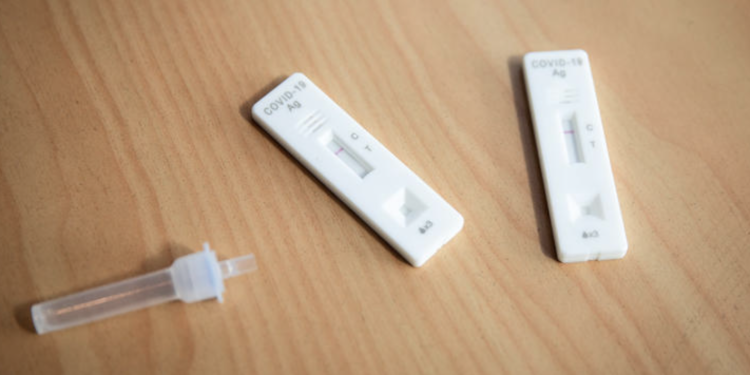As the world grapples with the spread of COVID-19, people are scrambling to understand how serious the situation is and how long they have to prepare.
There are no concrete answers to these questions, creating anxiety and fear among people who don’t know what to do next. The good news is that we have a tool at our disposal that can help us quickly understand the risks and benefits of self-isolation: a simple COVID-19 test.
These days, we’re seeing many people getting tested at drive-thru or walk-up clinics. But what about those who aren’t comfortable with that? Well, you can do a home test. And it only takes a few minutes.
Before you decide to take a self-test, be sure to wash your hands properly. Also, don’t touch your mouth with your fingers because you can contaminate yourself by doing this. Don’t shake hands with people who have a cough. If they do so, it is possible that they could give you COVID-19.
You should also avoid public places such as bus stops, airports, restaurants, shopping malls, and theaters. If you have been outside, wash your hands again immediately. When you are indoors, you should wash your hands before using the toilet and before you eat. The virus can live in the bathroom or on the toilet seat. It is important to wash your hands properly. There are many ways to do it. For example, you can use alcohol-based sanitizers. They are inexpensive and easy to find. Just make sure that a reputable company makes the product you buy.
There are currently a lot of different rapid antigen tests being used, and many of them have their own specific results and interpretations. CDC recommends that people who have been exposed to COVID-19 get tested at least 72 hours after symptoms first appear and at least five days after exposure. If a person is experiencing a fever, cough, or shortness of breath, they should stay home and contact their health care provider before getting tested.
You’re probably wondering if you should be tested for COVID-19 right now. I know you don’t want to wait until you’re sick to find out if you’re infected—and neither do we. That’s why we’ve put together this step-by-step guide that will help you do a COVID-19 Self Test as soon as possible. Just follow these four easy steps:
1. Get the test kit from a pharmacy or order online
2. Take the test.
3. Get your results.
4. Act accordingly.
Is it safe to do the COVID-19 test at home?
It is better to get tested at home because you will be able to get the results right away and won’t need to spend time in the hospital. Also, you won’t need to wear a mask. This is because you don’t have to breathe in a machine. You just need swabs that will just collect the fluid from the nose and mouth. It is the safest way to do it. You don’t need to worry about how many people are around you.
What to do if you are tested positive for COVID-19 after an antigen test?
Don’t panic! You should not feel afraid or worried because if you are positive for coronavirus, you will recover quickly with the help of medical treatment. Your symptoms will disappear, and the virus will not be able to stay in your body anymore. Don’t let this situation overwhelm you.
Take all the necessary precautions to protect yourself from getting sick. If you follow these instructions, you will be able to recover soon. This will allow you to continue living your life without worrying about the virus. If you are a healthcare worker, you should continue working. There is a chance that you may contract COVID-19, but if you are doing your job well, it is very unlikely.
How to prevent yourself from catching the virus?
The best way to prevent the virus is to wash your hands frequently. We should always do this when we are going out or if we are in the store. Also, try to avoid touching your eyes, nose, and mouth with your hands. You can use a tissue to cover your mouth while you are talking. It will keep your hands clean. If you don’t have tissues, you can even use your elbow.
What to do if you are tested negative for COVID-19?
There is no need to be alarmed. If you test negative for COVID-19, it means that you have no antibodies for the virus. However, it doesn’t mean that you are not infected with the virus. It simply means that you have not been exposed to the virus. You need to be careful to avoid getting sick. That’s because you might infect someone else. If you are experiencing any of the symptoms, such as a fever, cough, or shortness of breath, make sure to stay home. If you start to feel worse, see a doctor immediately.
What’s the difference between a PCR and antigen COVID-19 test?
Antigen tests are easy to do because they only take a few minutes to complete. In a PCR test, a person will get swabbed and then put in a machine to be tested. The result comes out later, and it takes much longer. Some people prefer the PCR test because it is more accurate. However, there is a big drawback with this test. It is very expensive, so most people do not have access to it. It is better to do the healgen antigen test because you will have a faster result. You can take this test at home.
The Bottom Line
In conclusion, the COVID-19 pandemic has created an unprecedented need for rapid antibody testing for antibodies to the virus. These tests give you an idea of your immune system’s response to the infection. The rapid antigen test looks for the presence of the virus itself. Because this test does not require a blood sample, it can be done quickly, accurately, and with minimal discomfort.














